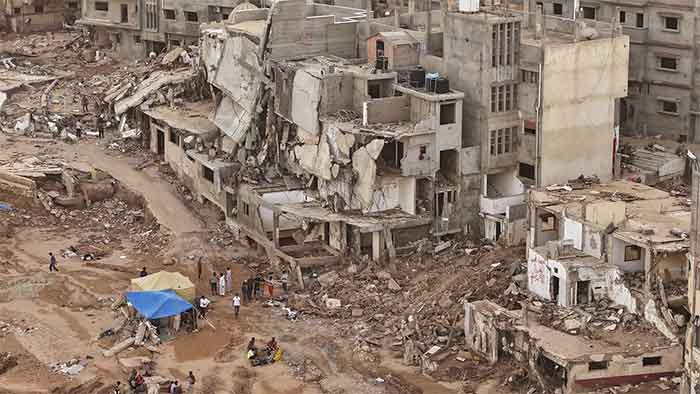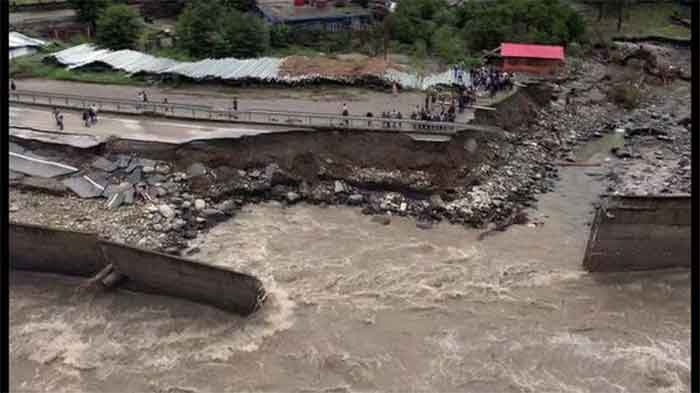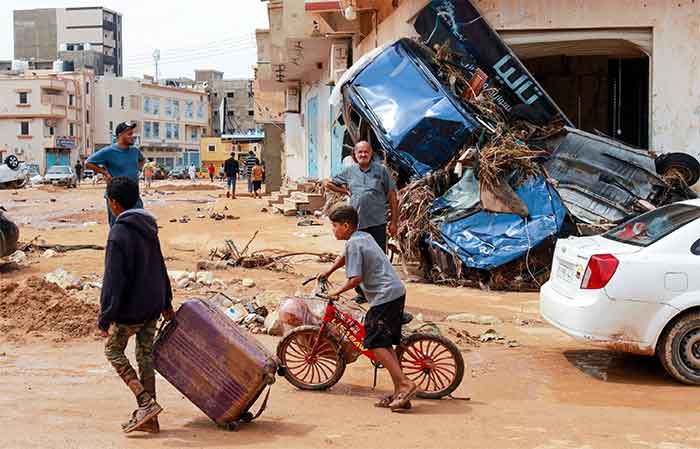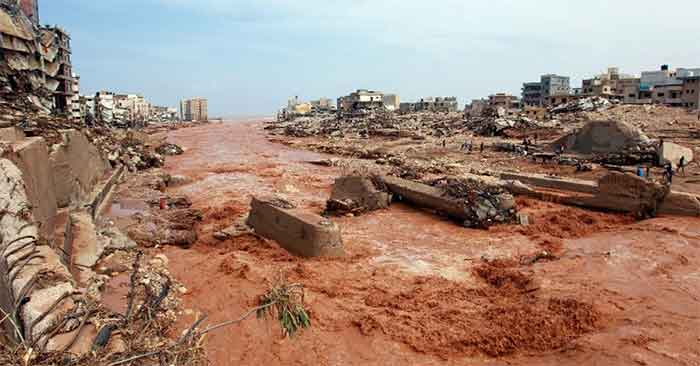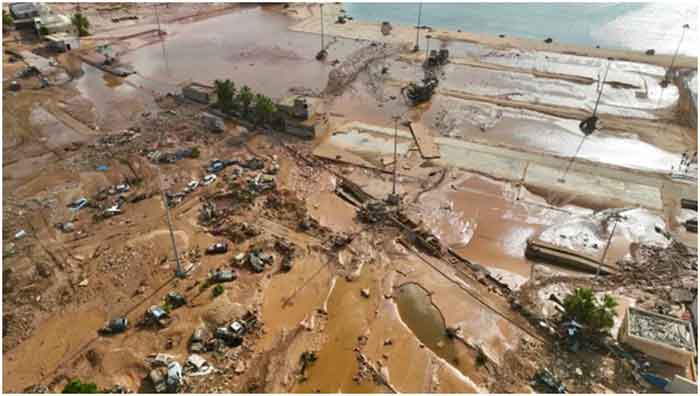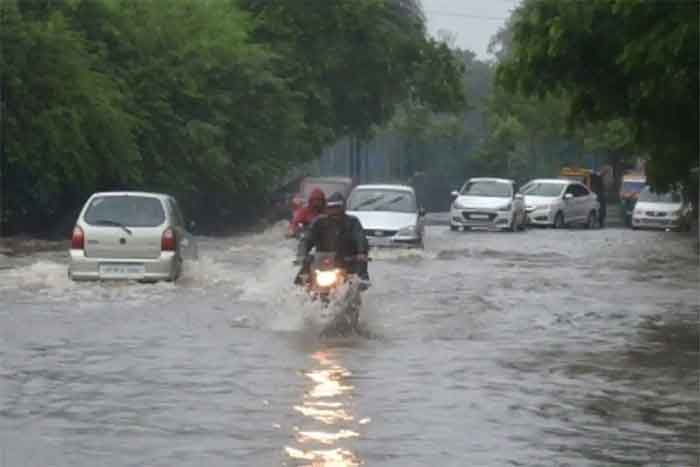
Roads are crumbling, bridges are collapsing and railway lines are flooded . The surging waters from the rivers are drowning entire villages all around. It has rained so much that even where there is no flood, the kutcha houses have become wet and some are falling apart. Schools have declared holidays and public transport is closed. People are unable to reach the hospital even when their health is critical.
In rural areas, many pregnant women are being delivered in an unsafe environment through traditional methods at home. The power supply system has collapsed in both the city and village. Nights are spent in complete darkness, as insects enter the houses. The number of mosquitoes has increased. The food kept in the house is getting spoiled. Household goods are floating away along with the floods. Boats are now ferrying people in urban neighbourhoods. The situation has become such that in many places the help of the army has to be taken to protect life and property.
This is the condition of Madhya Pradesh following heavy rains on 21, 22 and 23 August. According to a report of the Meteorological Department of the Union Ministry of Earth Sciences, from June 1 to June 24 the rainfall in MP this year increased to 923.3 mm from 718.9 mm of rain last year. This is 28 percent more. There are some districts here where there has been 120 and 130 percent more rainfall than normal.
The percentages however do not tell you how the rain fell. It was not a steady downpour spread over months. First there was a long dry spell as the monsoon season began officially. And when nobody expected it the rain poured non-stop, in huge volumes, all at once.
According to Subhash C Pandey, a climate expert, there is now more rain in less time, which is the result of climate change. In the earlier years also there was heavy rain, but it did not rain so much in a day or two, but only over four months of the season. Dr. Pandey compares the rainy season so far with the previous one and says that the rains should have started from the first week of June. There was no rain during the entire month of June. It started raining properly from around 5th July and in a short span of time it has rained twice as much as normal. This is not a good sign.
In Bhopal, the capital of MP, it rained continuously for 36 hours, dumping 15 inches of water. Life became so chaotic that many settlements had to be evacuated. More than 200 villages in Raisen district adjoining the capital were engulfed in floods.The people of Betul district had lost contact with the surrounding towns and villages. The same was the case with Harda. In many villages of Vidisha, there was a situation of submergence. Here the army had to come to the rescue.
A similar unusual situation was also seen during the summer season, when the maximum temperature in MP was recorded from 45 to 48.7 degree Celsius. Compared to previous years, a heat wave had engulfed those districts also, where there was nothing like that situation in the past. In recent years, the winter season also comes late and leaves quickly. This is affecting the yield of winter crops.
The government does not tell you the real reasons behind the new weather patterns – the impact of climate change. There is nothing being done to address the real problem and nobody wants to say or do anything about it. Rather, every time such a disaster hits the lives of people it is presented as an Act of God
But experts working independently on climate change issues are doing research on its impact on the weather and the potential threat posed to vast human populations in India. They are studying the problem while
both the state government and the departments related to climate change are not showing seriousness.
 The government does not have any concrete plan to deal with climate change in MP. Government departments, designated to work on climate change do not have any plan. The MP government has never discussed this subject in detail in the assembly at a time when climate change has become a matter of concern for the whole world. The people’s representatives, elected by the public, are also clueless. In recent years, out of the total questions asked in the MP Assembly, none of the questions related to climate change. A look at the history of debates and questions in the MP Assembly also shows that there has been no detailed discussion in this regard during the tenure of the present government.
The government does not have any concrete plan to deal with climate change in MP. Government departments, designated to work on climate change do not have any plan. The MP government has never discussed this subject in detail in the assembly at a time when climate change has become a matter of concern for the whole world. The people’s representatives, elected by the public, are also clueless. In recent years, out of the total questions asked in the MP Assembly, none of the questions related to climate change. A look at the history of debates and questions in the MP Assembly also shows that there has been no detailed discussion in this regard during the tenure of the present government.
It is true that the central government had assured the international community in 2015 that India will cut carbon emissions by 33 to 35 per cent by 2030 and increase renewable energy generation capacity by 40 per cent. India has set a target of reducing carbon dioxide equivalent to 2.5-3 billion tonnes through development of additional forests by 2030. These assurances were given as part of the Paris Agreement on climate change. It is a legally binding international agreement and was accepted by 196 nations at the United Nations Conference on Climate Change in Paris on 12 December 2015 and came into effect from 4 November 2016.
In MP too, there is talk of developing renewable energy to phase out coal based power generation. The Madhya Pradesh government has encouraged industries to set up wind, solar and hydro plants. Subsidy of several thousand crores has been given. It has been resolved to buy power from these plants on priority basis. However, there is no action on the ground as yet. The result of which is that now Madhya Pradesh is struggling to produce 25 thousand MW of electricity, needed by the state on a regular basis.
The reality is that even before the rains, the power crisis in MP had deepened. When the supply of coal was disrupted, electricity was unavailable for hours in rural areas. Then these wind, solar and hydro plants could not fulfil the requirement. Power was restored in rural areas when coal supply was restored, so it would not be entirely correct to say that the government has done a great job in the field of renewable energy and coal-generated electricity is being phased out. Rather, despite so many efforts, coal-based electricity is still the mainstay, so it cannot be said that MP will be successful in reducing carbon emissions.
Rajkumar Sinha, a civic rights activist, says that climate change is a big and serious topic. Our public representatives need to be serious on this. Unless the people’s representatives come forward, no efforts in this direction can be fruitful. If this is delayed then the situation will worsen further.
To deal with the dangers of climate change, there should be review of all big projects that involve excavation of mountains, deforestation, and the potential for setting off forest fires. All new road, rail and dam construction should be stopped unless absolutely necessary.
Pooja Yadav is a journalist based in Bhopal

